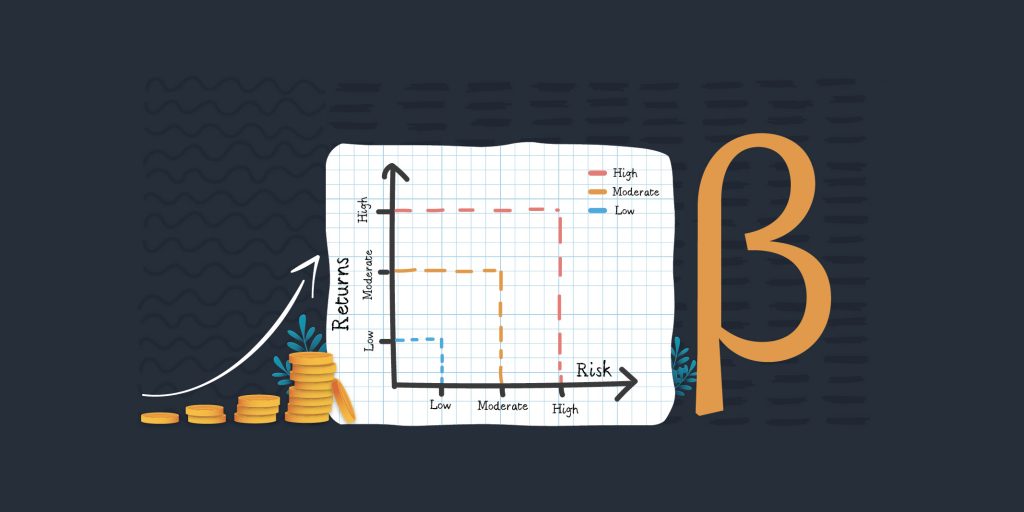Last Updated on Jan 20, 2024 by Anjali Chourasiya
Wouldn’t it be great if you had an indicator of how risky a stock can be? It would simplify choosing a stock that best suits your risk appetite, right? Well, you do have such an indicator, and it is called ‘beta’. Does ‘high beta stocks’ ring a bell? If not, we’ll talk about it in a bit.
If you have the itch to learn more about this risk indicator and what are high beta stocks, jump right in. We have also drawn up a list of high beta stocks in Nifty 50 in the article.
Table of Contents
Risk: the premise for high beta stocks
Stock investing is a risky business. But what comes without risk? Let us get this straight. Money only grows when invested. There’s no alternative to it. When you entrust your money to someone else to grow it, a risk factor is associated with it. You may run into losses and have to accept lower-than-expected returns; if the losses run too deep, you may not get your funds back at all.
So, does this stop you from investing? Mostly, no. You still invest in relatively low-risk instruments, or you may diversify thoughtfully. The same goes for stocks. While some are highly volatile, others may not be as much. Higher the volatility, the more risky the stock is, and vice versa. So, how do you ascertain the volatility of stocks?
Using ‘beta’.
What is beta in the stock market?
Beta is a statistical measure of a stock’s volatility compared to the broader market or a benchmark index. It is calculated using regression analysis, a statistical method used to find the relationship between a dependent variable with one or more independent variables. In the context of stock beta, the volatility in the broader market is the independent variable, and the risk associated with the stock is the dependent variable.
Features of top high beta stocks in NSE
High beta stocks have distinctive features that differentiate them from low beta or average beta stocks. Here are some key features of high beta stocks:
- Sensitivity to market movements: High beta stocks are more sensitive to overall market fluctuations. They tend to rise more during bull markets and fall more during bear markets than the broader market.
- Volatility: These stocks exhibit higher price volatility than the overall market. The prices of high beta stocks can experience more significant and frequent price swings.
- Aggressive growth potential: Companies expecting rapid growth often align themselves with high beta stocks. Investors are attracted to these stocks for their potential for high returns.
- Cyclical industries: Many high beta stocks are found in cyclical industries such as technology, biotech, and commodities. These industries are more prone to economic cycles and can experience significant ups and downs.
- Beta coefficient above 1: Beta measures a stock’s volatility compared to the broader market or a benchmark index. High beta stocks typically have a beta coefficient greater than 1, indicating a higher volatility level than the market.
- Higher returns (potentially): Due to their higher volatility, high beta stocks may have the potential to deliver higher returns, especially during bullish market conditions.
- Higher risk: The increased volatility and sensitivity to market movements make high beta stocks riskier. Investors should be prepared for larger price fluctuations and potential losses.
- Speculative nature: Investing in high beta stocks is often considered more speculative because of the uncertainty and risk associated with their price movements.
- Interest rate sensitivity: High beta stocks may be more sensitive to changes in interest rates. Rising interest rates can negatively impact these stocks, while falling rates may have a positive effect.
- Investor sentiment impact: High beta stocks can be influenced by changes in investor sentiment. News, market rumours, and speculative trading can significantly impact their prices.
- Less stable dividend payments: Companies with high beta stocks may prioritize reinvesting in the business for growth rather than paying stable dividends. Dividend payments may be less predictable compared to low beta stocks.
High beta stocks meaning
Shares with a beta value higher than 1 are high beta stocks. Simply put, these are relatively volatile and risky. And going by the risk-reward relationship, this stock can potentially give higher returns (but remember, high risk never guarantees high returns). That’s why investors looking to create significant wealth through shares go for stocks with high beta.
High beta 50 stocks list – 2024
Here’s a list of high beta stocks – NSE 2024
| Name | Sub-Sector | Market Cap (Rs. in cr.) | Close Price (Rs.) | PE Ratio | Beta |
| Indusind Bank Ltd | Private Banks | 1,25,440.42 | 1,535.35 | 16.85 | 2.33 |
| Bajaj Finserv Ltd | Insurance | 2,51,647.11 | 1,581.00 | 39.21 | 1.95 |
| Bajaj Finance Ltd | Consumer Finance | 4,48,641.51 | 7,301.30 | 38.99 | 1.89 |
| Hindalco Industries Ltd | Metals – Aluminium | 1,24,179.70 | 561.05 | 12.30 | 1.85 |
| Tata Motors Ltd | Four Wheelers | 2,99,848.32 | 818.90 | 124.20 | 1.73 |
| Adani Enterprises Ltd | Commodities Trading | 3,32,754.93 | 2,987.90 | 134.56 | 1.56 |
| Axis Bank Ltd | Private Banks | 3,38,508.31 | 1,121.00 | 31.29 | 1.54 |
| Tata Steel Ltd | Iron & Steel | 1,61,095.12 | 133.95 | 18.39 | 1.47 |
| State Bank of India | Public Banks | 5,60,733.37 | 631.40 | 10.08 | 1.44 |
| ICICI Bank Ltd | Private Banks | 6,91,974.75 | 1,008.70 | 20.33 | 1.32 |
Note: The list of top 10 high beta stocks in NSE as of 20th January 2024 and derived using Tickertape Stock Screener using the following parameters.
- Stock Universe: Nifty 50
- Beta: Sorted from highest to lowest
How to find the beta of Indian stocks?
You can find the beta of Indian stocks in 2 ways:
- Using the formula
- Using Tickertape’s Stock Screener
- Finding the beta of a stock using formula
- Get the historical prices for the desired stock.
- Get the historical prices for the comparison benchmark index.
- Calculate % change for the same period for both the stock and the benchmark index. Here, the period can be daily, weekly, and so on.
- Calculate the Variance of the stock.
- Find the covariance of the stock to the benchmark.
Now, Beta = Covariance/Variance
- Finding beta of shares using Tickertape’s Stock Screener
Since manually calculating the beta of a stock is prone to errors, you can easily view the beta coefficient of stocks on Tickertape’s Stock Screener.
Follow these steps:
- Open Tickertape
2. Click on the screener and select “Start Screening”
3. Click on “Add Filter”
4. In the “Search for Filters” box, type ‘beta’ and click on done.
5. The screener now returns stocks along with their beta value.
You can change the value of beta according to your preference. Add from over 200 filters to narrow down your search. Explore different sectors, universe, and create custom filters. Try it now!
High-beta stocks are usually issued by high-risk companies
Generally, small and midcap companies have a higher beta and are thus perceived to be risky. This is because companies having smaller balance sheets or fewer physical assets are more prone to economic disruptions than those with larger balance sheets. As such, the risk associated with a high beta stock can accelerate in times of economic turmoil and eat into your returns.
Let’s understand this with an example. To flourish, small and midcap companies need cheap credit and high demand, both of which can be scarce in times of economic turmoil. Once the economy shows signs of recovery—credit conditions get better, and demand picks up—these companies’ performance can also improve. (Note that this is not a prediction; nothing in the stock market is predictable. So, always do your due diligence before relying on market-related information from any source).
A note on small and midcap companies
Small and mid-cap companies are sensitive to macroeconomic factors. Therefore, any ongoing problem in the economy can almost immediately impact these stocks. Typically, such companies are risky businesses. They offer products that are in high demand and generate high turnover. Though their balance sheets are not large, the efficiency of their operations and internal management aid their growth and attract investors.
How to interpret the beta value of a stock?
Assign the benchmark index representing the overall stock market beta of 1. So if the beta value of a particular stock is higher than 1, it is more volatile than the overall market, which means that its price moves too frequently. And so it is considered relatively riskier. In contrast, a stock beta value lower than 1 is considered less volatile versus the market. Since such a stock is more stable, it is less risky. Here are three points that will help you make sense of beta in a better way.
Suppose Nifty 50 has a beta of 1. Here’s how to use a particular stock’s beta can be interpreted:
- Beta of less than 1: The stock is less volatile than the index. For example, if the Nifty moves down by 2.5%, the stock price falls at a lower rate.
- Beta equal to 1: The stock is as volatile as the Nifty 50. If the index increases, the stock is also likely to increase at a similar pace, and vice versa.
- Beta of more than 1: The stock is more volatile compared to the index. For example, if the Nifty moves up by 2.5%, the stock price increases at a higher rate.
Beta can also be negative!
A high negative beta means more volatility in the price movement. For example, if the Nifty moves up by 1.5%, the stock price falls by -1.25%.
Note that beta indicates a stock’s volatility and riskiness, not its price movement or the company’s relative strength.
Advantages of investing in high beta stocks
Help in wealth creation
Stocks with high beta carry higher risks and can generate high returns. Thus, investing in such stocks after careful evaluation and continual monitoring can help you create wealth.
Give high returns amid a market upswing
Since a high beta stock is sensitive to economic conditions, it tends to perform well when the market is swelling.
Returns higher than inflation
Since stocks with high beta generate high returns, the figure may surpass the inflation rate in the country.
Demerits of high beta stocks
Though the beta of a stock signifies the volatility and risk associated with it, relying solely on it would not be a wise move. Here’s why.
Are relatively riskier
Stocks with a beta value of more than 1 are riskier as they are sensitive to market volatility. Ergo, a downturn in the stock market can impact such stocks leading to huge losses.
Have other associated risks
The beta coefficient is the rate at which the price of a stock moves when compared to the broader market index. While this is an important indicator of the volatility with respect to the stock, there can be other associated risks as well. Ergo, if you simply rely on the beta value of a stock to invest in it, you may be ignoring other red flags, such as inefficient management or operations.
Reliance on past data
The beta coefficient is calculated based on past data of stock. So it is a good indicator of the stock’s past performance but doesn’t guarantee future performance. Here’s why.
Assume that a well-established company has a beta of less than 1. The beta will not have accounted for this in the company’s risk profile if it avails a massive debt for expansion.
The debt changes the company’s risk profile. What if the proportion of debt is higher than equity? Then the company’s debt-to-equity ratio will be higher than before. And if the company is unable to repay its debt on time, the creditors will have a higher stake in the company’s assets than its shareholders.
So, as a shareholder, you will be at more risk when a company avails debt. See how the story changes?
That is why relying on beta information alone may not be a good investment decision when evaluating a stock.
Factors to consider before investing in high beta stocks
Before investing in high beta stocks, consider the following factors:
- Risk Tolerance: As high beta stocks are more volatile and can experience more significant price swings, it is astute to assess your risk tolerance. Ensure that you are comfortable with the potential for increased risk and market fluctuations before making any investment decision.
- Investment Goals: Clearly define your investment goals. Determine whether seeking higher returns aligns with your objectives and if the potential for increased volatility matches your risk-return preferences.
- Market Conditions: Evaluate the current market conditions. High beta stocks may perform well in bullish markets but can be more vulnerable during market downturns. Consider the overall economic environment and market trends before investing.
- Company Performance: Conduct thorough research on companies with high beta stocks. Analyse their financial health, growth prospects, and recent performance. Understanding the companies’ fundamentals can help you make an informed decision.
- Industry Trends: Consider the industry in which the high beta stocks operate. Some industries are inherently more volatile and cyclical than others. Hence, being aware of industry trends and potential external factors that may impact the stocks can be wise.
- Valuation: Evaluate the valuation of high beta stocks. Ensure that the stocks are not overvalued and their current prices are justified based on the companies’ fundamentals and growth potential. For this purpose, you can check the Tickertape Scorecard for each stock. Learn more about it here.
- Diversification: As high beta stocks are associated with high risk, it is worthwhile to consider maintaining a diversified portfolio to spread risk. While high beta stocks can offer opportunities for higher returns, it’s essential not to concentrate your entire investment in this category. Diversification helps mitigate the impact of poor-performing stocks.
- Investment Horizon: Define your investment horizon. High beta stocks may require a longer-term perspective to reduce short-term market volatility. Consider whether your investment timeline aligns with the potential volatility of these stocks. It may be worthwhile to consult an expert for this before investing.
- Interest Rate Environment: Assess the prevailing interest rate environment as the changes in interest rates can impact the performance of high beta stocks. Understand how rising or falling interest rates may influence the specific stocks you are considering.
- Research and Due Diligence: Engage in thorough research and due diligence. Understand the factors driving the high beta nature of the stocks and stay informed about upcoming events/announcements that could impact their prices.
- Exit Strategy: It is crucial to have a clear exit strategy in place. It is essential so you don’t ride the wave of volatility and end up losing. Determine under what conditions you would consider selling your high beta stocks. This proactive approach helps manage risks and may prepare you for various market scenarios.
Should you invest in high beta stocks?
Now that you know the concept of beta and how to get the list of high-volatility stocks, you may be wondering if you should invest in these stocks. Well, the answer solely depends on two factors:
- Your experience in stock markets
Seasoned investors have a better understanding of stock markets. They know to analyse market swings and use their observations to predict the market. They know when to enter and exit a particular stock and the extent of exposure to take on. Moreover, they analyse domestic and global market conditions when studying a stock. This makes seasoned investors better equipped to invest in a high beta stock. If you are a beginner and wish to invest in such stocks, it is highly important to study the markets first and only then venture out.
- Your risk tolerance and return expectation
Being a seasoned investor is not a prerequisite to investing in high beta stocks. As mentioned earlier, stocks with high beta are risky but can potentially generate high returns. Ergo, you should also be comfortable with taking a high risk. Moreover, you shouldn’t be demotivated when the market faces a crisis. Because, generally, when the market suffers, such stocks can fall hard. So you must be prepared to bear losses until the market recovers. It is even better to hold stocks for the long term.
If both these boxes are ticked, you can consider investing in high beta stocks.
What are high alpha and low beta stocks?
High alpha low beta stocks are characterized by superior returns relative to their risk, measured by a beta coefficient below 1. These stocks exhibit lower volatility than the broader market, making them less prone to significant price fluctuations. Despite their stability, high alpha low beta stocks consistently outperform the market, as indicated by a positive alpha coefficient.
Investors are drawn to this category for its attractive balance of lower risk and the potential for above-average returns, offering a more conservative investment approach with the prospect of outpacing overall market performance. Thorough research is advisable before including these stocks in a portfolio due to varying market conditions and individual stock characteristics.
Conclusion
There you go! By now, you may have understood what a high beta stock is, its merits and demerits, and whether you should invest in it or not. You also know how to get the list of high-volatility stocks using Tickertape Stock Screener.
Be mindful of not basing your investment decisions on a stock’s beta alone. Ensure to look at more than just the beta value. Evaluating the company’s internal management and conducting fundamental and technical analysis of the stock is equally important.
FAQs about high beta stocks
What is the beta of a stock?
What is the best beta for a stock?
Where can I find the top 10 high beta stocks of NSE?
If you want a list of highly volatile stocks in Nifty 50, select the universe as Nifty 50.
Are low-beta stocks risky?
How to find high alpha, low beta stocks?
– Open Stock Screener
– Click on ‘Add Filters’
– Search and select ‘Alpha’. Set it to high
– Again, click on ‘Add Filters’ and select ‘Beta’. Set ‘Beta’ to low
You can use other filters as well to narrow the search and find the best stocks according to your preferred parameters.
What are high beta value stocks?
Investors considering high beta value stocks should carefully assess their risk tolerance, investment objectives, and market conditions, as these stocks are known for their potential for both substantial gains and heightened volatility.







